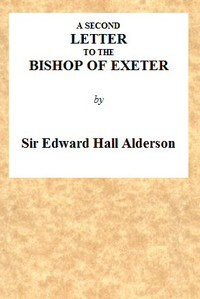| Author |
Alderson, Edward Hall, Sir, 1787-1857 |
| Title |
A Second Letter to the Bishop of Exeter
|
| Alternate Title |
A 2nd Letter to the Bishop of Exeter
|
| Note |
Reading ease score: 51.2 (10th to 12th grade). Somewhat difficult to read.
|
| Credits |
Transcribed from the 1851 Joseph Masters edition by David Price
|
| Summary |
"A Second Letter to the Bishop of Exeter" by Sir Edward Hall Alderson is a theological treatise addressing ecclesiastical jurisdiction and governance within the Church of England, written during the mid-19th century. The book delves into the implications of the Privy Council's judgment in the Gorham Case, emphasizing the relationship between the Crown and the Church, and the authority of bishops in the ecclesiastical hierarchy. In this letter, the author attempts to clarify the nature of the Duplex Querela and its significance within ecclesiastical law. Alderson discusses the jurisdictional powers of the Archbishop of Canterbury and argues against the notion that any ecclesiastical rule has been violated by the Crown's involvement in church matters. He explores the concept of Royal Supremacy, indicating that while the Crown holds significant authority, it does not extend to interfering with the core spiritual functions of the Church. Instead, he advocates for a collaborative relationship between the secular government and the Church, suggesting that the legislative powers should be exercised with input from Convocation to ensure the Church’s integrity and function properly within the state framework. (This is an automatically generated summary.)
|
| Language |
English |
| LoC Class |
BX: Philosophy, Psychology, Religion: Christianity: Churches, Church movements
|
| Subject |
Great Britain. Privy Council. Judicial Committee
|
| Subject |
Gorham, George Cornelius -- Trials, litigation, etc.
|
| Subject |
Phillpotts, Henry, 1778-1869 -- Trials, litigation, etc.
|
| Subject |
Baptism -- Law and legislation -- England -- History -- 19th century
|
| Subject |
Baptism -- Church of England -- History of doctrines -- 19th century
|
| Category |
Text |
| EBook-No. |
58106 |
| Release Date |
Oct 15, 2018 |
| Copyright Status |
Public domain in the USA. |
| Downloads |
92 downloads in the last 30 days. |
|
Project Gutenberg eBooks are always free!
|

